#military aid
Text
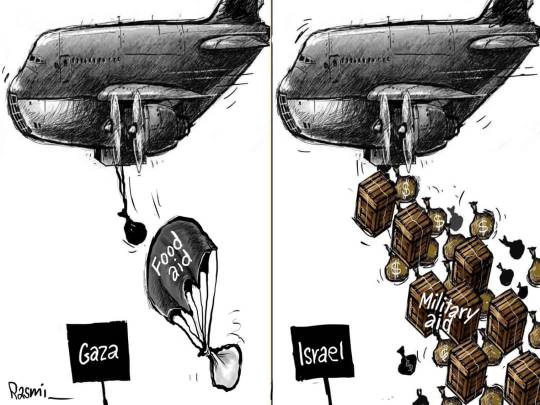
#aid#food aid#military aid#gaza#israel#free palestine#support palestine#palestine#israel is an apartheid state#palestinian genocide#free gaza#this is genocide#gazaunderattack
5K notes
·
View notes
Note
Can you explain the Iran-Israel situation please?
Alright, let's get to it. Please note that I'm writing this on mobile during my lunch break, so I can't include reference/source links as much as I'd like. Thankfully, most of what I'm going to be telling you should be easily located by searching for an article on one of the following: APNews, Reuters, BBC Global News Podcast, Democracy Now!, NPR, or The New York Times. Long-term background is probably best found in videos by the YouTube channels Real Life Lore or tldr global news, or on Wikipedia if you prefer text.
The short version: Israel attacked Iran's consulate in Syria to get at some of the military commanders that were there, which is legally equivalent to attacking Iran itself. Iran responded by sending about 300 bombs at Israel, most of which were shot down in transit. Given that they still called it a success, even though it seems only one person was even hurt, my understanding is that it's very likely that they only intended the rockets to be a show of force, rather than an actual escalation, because Iran can't afford a war right now.
To support my blogging so I can move out of my parents’ house, I do have a ko-fi. Alternately, you can donate to one of the charities I list in this post OR this post.
The long version:
Okay, let's start with some background on Israel, then Iran. This is... a lot, so if you already know the broad strokes skip down to 2023.
Israel was established following WWII by the English and French, following borders the two countries had secretly drawn up decades earlier in the Sykes-Picot agreement. The intent was to give the Jewish people a place to go... or, depending on who you ask, a place to send them. Their ancestral homeland was viewed as the best choice, sort of like a deportation millennia after a diaspora. Given that WWII had just ended by the time Sykes-Picot was actually put into effect, 'getting out of Europe' was something a lot of Jews were given to agree with.
The Arab world was not happy, as that land had belonged to the Ottomans for centuries, and had long since 'naturalized' to being Arab. I'm not going to pretend to know the nuances to when people do or do not consider Palestine to have been its own nation; it was an Ottoman state until WWI, at which point it came under British control for just under three decades, and that period is known as the British Mandate of Palestine; it ended after WWII, with the creation of Israel. Palestine's land and people have sort of just been punted around from one colonizer to another for centuries.
Iran is the current form of what was once Persia. They were an empire for a very long time, and were a unitary monarchy up until the early 20th century; in 1925, Iran elected a Prime Minister who was then declared the monarch. The following several decades had Iran's monarchy slowly weakened, and occasionally beset by foreign interventions, including a covert coup by the US and UK in 1953. The country also became more corrupt throughout the 1970s due to economic policy failing to control inflation in the face of rising oil prices.
In 1979, there was a revolution that overthrew the monarchy and the elected government, replacing the system with a theocracy and declaring Iran to be an Islamic Republic, with the head of state being a religious authority, rather than an elected one. This was not popular with... most countries. 1980 saw the closure of all universities (reopened in 1983 with government-approved curriculums), as well as the taking of over fifty American hostages from the US Embassy in Iran. You may have heard about that in the context of Ronald Reagan encouraging Iran to keep the hostages until the end of Carter's term in order to force the election.
So, the West didn't like having an Islamic state because it claims to like democracy, and also because the Islamic state was explicitly anti-American and this has some Bad Effects on oil prices. The Soviets didn't like having an Islamic State because a theocracy goes directly against a lot of communist values (or at least the values they claim to have), and weakened any influence their supposedly secular union could have on Iran and the wider middle east. The other countries in the Arab world, many of them still monarchies, didn't like the Islamic republic because if the revolution spread, then it was possible their monarchies would be overthrown as well.
(Except Oman, which is not worried, but that's the exception, not the rule.)
This is not a baseless worry, because Iran has stated that this is its goal for the Arab world. Overthrow the monarchies, overthrow the elected governments, Islamic Rule for everyone. That is the purpose of its proxies, like Hezbollah (Lebanon), the Houthis (Yemen), and Hamas (Palestine), along with less well-known groups like the Salafi Jihadists in Mali, who are formally under the umbrella of al-Quaeda, which Iran denies having any relation to but is suspected of funding. In areas where these proxy groups have gained power, they are liable to enact hard Shari'a law such as has happened in Northern Mali and other parts of the Sahel region.
While other conflicts have occurred in these countries, I think the above is most relevant.
Israel has repeatedly attacked, or been attacked by, other nations in the middle east, as they are viewed as having taken over land that is not theirs, and as being a puppet of the US government. The biggest conflicts have been 1947-1948, 1968/1973, and 2014.
And then, of course, 2023.
Now, Iran, more than any other nation in the Middle East, hates Israel. They have for a very long time, viewing them as an affront to the goal of spreading Islam across the whole of the middle east, and as being a front and a staging ground for the United States and other Western powers. Two common refrains in the slogans of Iran and its proxies are "Death to America" and "Death to Israel."
Due to Iran's military power and virulence towards Israel, the United States has been funneling money to Israel for decades. It has more generally been to defend itself against the Arab world at large, but it has narrowed over the decades to being about Iran and its proxies as relations have normalized with other nations like Egypt and Saudi Arabia.
Cue October 7th, 2023. Hamas invades Israeli towns, kills some people, and takes others as hostage. Israel retaliates, and the conflict ramps up into what is by now tens of thousands of dead, some half of which are children.
In this time, Hamas's allies are, by definition, Iran and the other proxy forces. Hezbollah, being in Lebanon, share a border with Israel's north. They have been trading rocket fire across the border in waves for most of the past six months. The Houthis, down in Yemen, claim to be attacking the passing cargo ships in order to support Palestine. Given that the attacks often seem indiscriminate, and that the Houthi's control over their portion of Yemen is waning in the face of their poor governance, this is... debatable. It's their official reason, but given that "let's attack passing ships, claiming that we only attack Israeli or American ships and that it is to support Palestine" is rallying support domestically for their regime, it does seem to be more of a political move to garner support at home than about supporting Palestine.
Iran, however, has not attacked Israel. They've spoken out about it, yes, but they haven't done anything because nobody wants a regional war. Nobody can afford it right now. Iran is dealing with a domestic crisis due to oil subsidies bleeding the states' coffers dry, and the aging Ayatollah Ali Khamenei, the leader of Iran, refusing to pick a successor. They are looking at both an economic crisis and succession crisis, and a regional war would fuck up both situations further. Iran funds most of its proxies, and they can't do that, and fight a war on top of it, while their economy is in its current state. Pure self preservation says they don't want a war, especially with the ongoing unrest that's been going on for... well, basically since the revolution, but especially since the death of Mahsa Amini.
Meanwhile, in Israel, Netanyahu has been looking at corruption charges and legal issues since before the Hamas attack. It's generally agreed that if Israel were to hold new elections right now, he would lose and be replaced, and also immediately taken to court. Netanyahu wants to stay in power, and as long as the war on Hamas lasts, he is unlikely to get voted out. A change in leadership in the middle of a war is rarely a good idea for any country, and he's banking on that.
However, the war on Hamas rests on the shoulders of American money and supplies. Without that military support, Israel cannot fight this war, and America... is losing patience.
Officially, America and most of the western world have been telling Israel to not fucking escalate for the majority of the war.
There have been implied threats, more or less since Schumer's big speech about how Israel needs a new election, of American legislators putting conditions on any future aid. There have even been rumblings of aid being retracted entirely if Israel follows through on invading Raffah.
So...
American aid to Israel has, for a very long time, been given in the name of defending Israel against Iran and its proxies.
Israel has been fighting this war against Hamas for six months, killing what is by now innumerable civilians, on the power of US military aid.
Netanyahu benefits from the continued war due to domestic troubles.
Iran does not want a regional war, or really any big war, due to its own domestic troubles.
The US is, in theory, losing patience with Israel and threatening to pull the plug on unconditional support. It's very "we gave you this to fight Iran. Stop attacking civilians. If you keep attacking civilians, then you're going to have to rely on what we already gave you to fight off Iran so that you won't keep wasting it on civilians."
Israel... attacks Iran, prompting a response, and is now talking about escalating with Iran.
I am not explicitly saying that it looks to me like Israel, which is already fighting a war on two physical fronts and even more political/economic ones, has picked a fight with Iran so that America feels less like it is able to withdraw support.
I just... am finding it hard to understand why Israel, which is in fact fighting both Hamas and Hezbollah, would attack the Iranian consulate in Syria otherwise. They can't actually afford to fight this war, escalating to a full regional conflict, on a third front.
Not without pressuring American into keeping the faucet of military funding open at full blast.
To support my blogging so I can move out of my parents’ house, I do have a ko-fi. Alternately, you can donate to one of the charities I list in this post OR this post.
#phoenix politics#current events#iran#israel#hamas#houthis#hezbollah#syria#politics#united states#military funding#military aid
96 notes
·
View notes
Text

source 1
source 2
source 3
#destiel meme news#destiel meme#united states#news#us news#world news#us politics#ukraine#ukraine 🇺🇦#slava ukraini#military aid#maybe stop sending billions to israel#us congress#white house#biden administration
77 notes
·
View notes
Text
People who tell you they they don't trust the media will read headlines and immediately trust them when they say that this many millions or this many billions are in a new aid package to Ukraine. What they don't understand is that most of the time the value of the military aid that is being sent over was already paid for for our use, in some cases decades ago. It is going to expire at some point, and since we're definitely not going to use it, what that means is that we'd actually pay more to dispose of that weaponry then we pay when we send it to Ukraine. So what we're doing now actually is a cost-saving thing. Instead of paying to dispose that weaponry we are paying less to dispose of Russians.
- James, aka Spaghetti Kozak in the Toronto TV podcast
#ukraine#russia#usa#biden#war in ukraine#russian invasion in ukraine#russo ukrainian war#military aid#russian propaganda
151 notes
·
View notes
Text
Blinken: US urging Israel to investigate airstrike that killed World Central Kitchen workers | Reuters
Washington has urged Israel to conduct a swift, thorough and impartial investigation into an Israeli airstrike that killed seven aid workers with the World Central Kitchen charity in Gaza, U.S. Secretary of State Antony Blinken said on Tuesday.
Blinken arrived in Paris for talks with senior officials including President Emmanuel Macron hours after the Washington-based NGO was struck by an Israeli airstrike in central Gaza, adding pressure on Washington to toughen its stance in the war between Israel and Hamas.
"We've spoken directly to the Israeli government about this particular incident. We've urged a swift, a thorough and impartial investigation," Blinken told reporters at a press conference in Paris, adding that humanitarian workers have to be protected.
"These people are heroes, they run into the fire, not away from it," he said of the NGO workers killed in the strike. "We shouldn't have a situation where people who are simply trying to help their fellow human beings are themselves at grave risk."
But Blinken stopped short of directly condemning the attack, unlike his French counterpart Stephane Sejourne.
Speaking alongside Blinken, Sejourne voiced France's "firm condemnation" of the Israeli airstrike.
"Nothing can justify such a tragedy," he said.
Israeli Prime Minister Benjamin Netanyahu said the airstrike was unintended and tragic, and the military pledged an independent inquiry.
Biden faces pressure from foreign partners, human rights groups and some of his fellow Democrats in Congress to impose conditions on arms transfers to rein in Israel’s offensive in Hamas-ruled Gaza where health officials say more than 32,000 Palestinians have been killed, many of them civilians.
"The killing of these employees – and so many U.N. and other aid workers – is unacceptable. Enough is enough. There must be an immediate and independent investigation," Democratic U.S. Senator Chris Van Hollen said.
Hours before the Israeli strike on WCK workers on Monday, Reuters reported that the Biden administration was considering proceeding with an $18 billion arms transfer package to Israel.
Asked if incidents like the killing of WCK workers made the United States think twice about its "flood of weapons" to Israel, Blinken did not address the specific question but said all U.S. arms transfers happened consistent to policy requirements.
"From Day One, we have worked to impress upon Israel, the imperative of protecting civilians, of adhering fully to international humanitarian law, to the law of armed conflict. That is something that we are looking at and review on a regular basis," he added.
CRITICAL MOMENT IN UKRAINE
Blinken was due to hold talks with Macron later in the day.
"You can sense the Americans are a bit uncomfortable at the moment," said one French diplomat, pointing to the contrast between Washington's humanitarian efforts in Gaza and its supply of weapons to Israel.
Earlier in the day, Blinken said Ukraine was at a critical moment in its war with Russia and urgently needs more Western support, bemoaning the stalemate in Congress over a multibillion-dollar military package for Kyiv.
"It is absolutely essential to get Ukrainians what they continue to need to defend themselves, particularly when it comes to munitions and air defences," he told reporters.
"It's another reason why the supplementary budget request that President (Joe) Biden has made to (the U.S.) Congress must be fulfilled as quickly as possible."
Biden has urged the Republican-controlled U.S. House of Representatives to endorse the military and financial aid package, but House Speaker Mike Johnson has held up the matter for months, citing domestic priorities.
#us politics#news#reuters#world politics#state department#Antony Blinken#israel#gaza#palestine#france#President Emmanuel Macron#Stephane Sejourne#World Central Kitchen#aid workers#idf#2024#free gaza#free palestine#genocide#benjamin netanyahu#sen. Chris Van Hollen#Biden administration#military aid#ukraine
21 notes
·
View notes
Text

Paradox game.
#ukraine russia war#ukraine#military aid#congress#mike johnson#republicans#avdiivka#ammunition#uncle sam#political cartoon
13 notes
·
View notes
Text
Oh NOW they do it!
It took them bloody long enough!
Can we start sanctioning the bastards next?!
Seriously. Can we?!
Because we should!
#dougie rambles#political crap#fuck azerbaijan#armenia#artsakh#usa#military aid#or lack thereof#caucasus#europe#war crimes#genocide#terrorism#reblog this#reblog the shit out of this#fuck Erdogan
27 notes
·
View notes
Photo
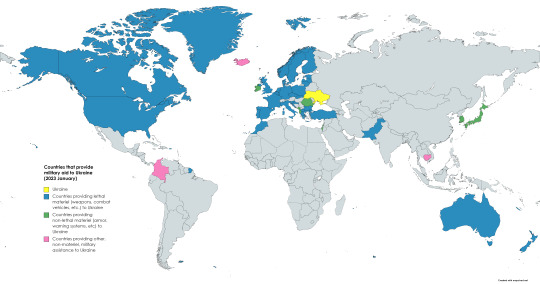
Countries that provide military aid to Ukraine, January 2023.
by u/KungUnderBerget
Worth noting is that this map only counts bi-lateral military aid provided by national governments, so funds or materiel provided through the EU, for example, is not included. Neither is the sale of military hardware.
In the case where the nature of the military equipment provided, lethal vs. non-lethal, is unknown (as with Albania) I have defaulted to non-lethal.
Iceland has no military of its own. So, instead of sending military equipment, it has helped shipping military equipment from other countries, like Slovenia, to Ukraine.
Both Colombia and Cambodia have committed to the training of Ukrainian deminers.
88 notes
·
View notes
Text
AN OPEN LETTER to THE PRESIDENT & U.S. CONGRESS
Enforce Leahy! No funding to IDF troops who’ve committed human rights abuses!
354 so far! Help us get to 500 signers!
I’ve just learned from Pro Publica that “a special State Department panel recommended months ago that Secretary of State Blinken disqualify multiple Israeli military and police units from receiving U.S. aid after reviewing allegations that they committed serious human rights abuses.” But Blinken has failed to act on the proposal. This in the face of growing international criticism of the Israeli military’s conduct in Gaza.
I’m livid about this. We cannot keep sending unconditional military aid to anyone, regardless of whom, if they are committing human rights abuses. We have Leahy laws to prevent it, and they are not being enforced here. It’s unacceptable.
The U.S. government needs to stop giving the Israeli government a blank check. Israel has a right to defend itself, of course, but the abuses described in Pro Publica’s report can’t be defined as self defense under anyone’s definition of the term. They’re abhorrent and our tax dollars mustn’t be spent on them. Thanks.
▶ Created on April 17 by Jess Craven
📱 Text SIGN PLLLRS to 50409
🤯 Liked it? Text FOLLOW JESSCRAVEN101 to 50409
#JESSCRAVEN101#PLLLRS#resistbot#Open Letter#Human Rights Abuses#IDF#Leahy Law#US Congress#President#Accountability#Foreign Policy#Military Aid#State Department#Secretary Blinken#Israel#Gaza Crisis#Humanitarian Crisis#Global Affairs#International Relations#Pro Publica#US Government#Political Action#Advocacy#International Law#Humanitarian Law#Justice#Peace Efforts#Activism#US Foreign Policy#War Crimes
5 notes
·
View notes
Photo


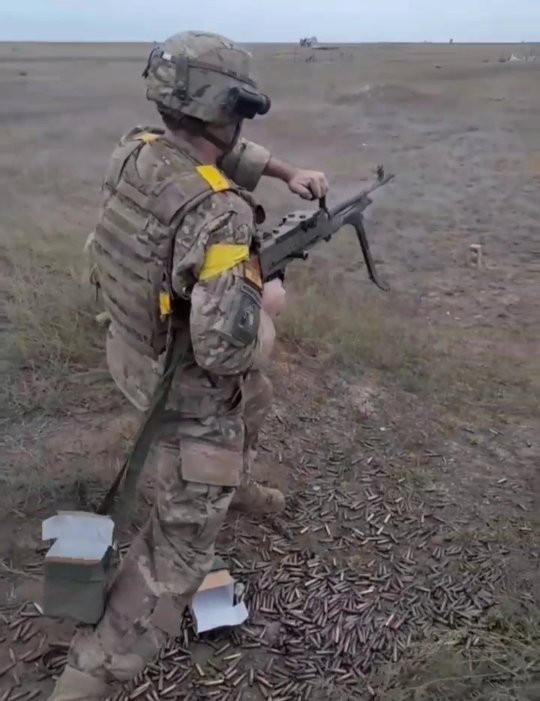
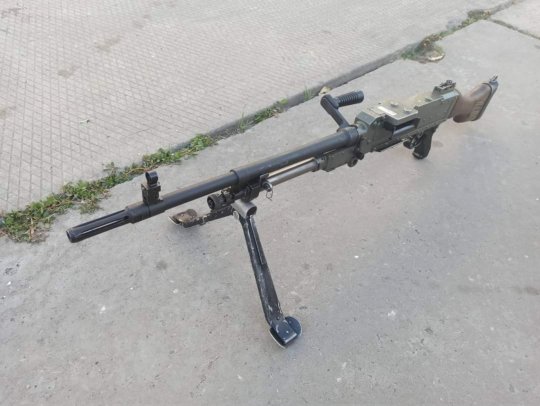
Sweden's KSP-58 Machine Guns In Ukraine
Over the past few months there have been a number of sightings of a relatively rare FN MAG variant in the field in Ukraine. The KSP-58B has been seen in use with Ukrainian Armed forces since September, in this video we take a brief look at the KSP-58B's features, history and look at who transferred the guns to Ukraine.
youtube
Check out the accompanying blog for the video over at armourersbench.com
91 notes
·
View notes
Text
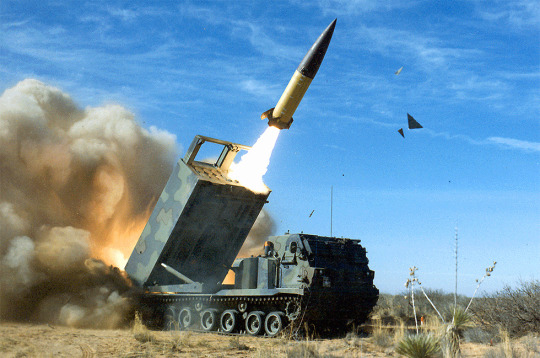
🇺🇸🇺🇦 🚨
UNITED STATES SENDS LONG-RANGE ATACMS MISSILES TO UKRAINE
A report published by Reuters on Wednesday says the Biden administration has quietly sent long-range ATACMS missiles to the Armed Forces of Ukraine.
The report claims the missiles are for use to fend off "Russian invaders," however, the Ukrainian military over the last year has used its HIMARS missile systems to bombard civilian areas of Russian and Ukrainian cities under the control of the Russian government, including attacks on Russian oil fields.
The long-range missiles were included in the latest $300 million military aid package for Kiev, approved by the Biden administration on March 12th, and were used for the first time in a strike on a Russian airfield in Crimea on April 12th, according to a U.S. official who spoke with Reuters under condition of anonymity.
The long-range ATACMS missiles have a range of up to 300km (187mi), which the Pentagon previously opposed sending to Ukraine out of concerns over U.S. military readiness and worries that the Armed Forces of Ukraine would use the missiles to strike deep into Russian territory.
#source
@WorkerSolidarityNews
#russia#ukraine#ukraine war#russia news#us news#us politics#us foreign policy#armed forces of ukraine#special military operation#russo ukrainian war#russia ukraine war#war#conflict#ukraine conflict#ukraine news#eastern europe#europe#europe news#european news#politics#news#geopolitics#world news#global news#international news#breaking news#current events#biden administration#military aid#atacms
4 notes
·
View notes
Link
False prophets
2 notes
·
View notes
Text

source
#destiel meme#destiel meme news#united states#us news#news#world news#taiwan#china#republic of china#people's republic of china#us military#military aid#beijing
15 notes
·
View notes
Text
We have had three reasons why the United States should treat questions related to military aid for Ukraine with far more urgency than it has thus far:
They need it.
They deserve it.
The wolf is at the door.
Now we see that the wolves are at the door, and Iran beat the Russians to it. Israel left the door unlocked. Iran has no trouble equipping its allies - Hamas, Hezbollah, Houthis - with the arms they need, for whatever missions these militias need to undertake. The United States' willingness to supply its allies with arms they need, when they need them, could not be more stark.
Why did it look like we sat back in the bleacher seats when Russia moved into Crimea in 2014? Because that's exactly the role we imagined for ourselves: spectators. Did anyone in the Obama White House imagine what we would do when Russia came back for seconds only a year later, where they attacked in eastern Ukraine in 2015? Did anyone in the Biden White House imagine what we ought to do in February 2022, when Russia came back for thirds after a two-month mobilization?
Apparently not. The best Washington could do was offer Ukraine's President Zelensky a flight out of Kyiv before the Russian army captured him. I wonder what Franklin Roosevelt would have thought if Winston Churchill had offered to ferry him out to London after Emperor Hirohito attacked Pearl Harbor? The United States had no strategy to help Ukraine win the war when it started in 1922, and it still does not.
The lack of a plan after two years - ten years if you count from 2014 - is still inexplicable to me. For every proposal that we gear our military aid to a strategy for victory, we utter the same response: we do not want to escalate. Yet Moscow escalates at will, with more and more strikes at civilian and military targets each month. Ukrainian leaders are at a loss to persuade its allies - and potential allies - that escalation, however you define it, is not an issue for them. It has the same goals that every other sovereign nation has: to live in peace within secure borders.
The United States has laid down many billions of dollars in aid at this point, with no plan to reach that goal. The only goal in sight appears to be the status quo: to maintain the current balance of military forces until both sides feel ready to negotiate based on -- the current balance of military forces. No wonder Ukraine wants to increase the capacities of its domestic armaments industries. No country among Ukraine's allies appears to want to help Ukraine win the war.
3 notes
·
View notes
Text
Congress has passed a bipartisan $858 billion defense bill that would give service members a hefty pay raise, bolster support for Ukraine and Taiwan, and rescind the US military’s COVID-19 vaccine mandate.
The Senate voted Thursday to pass the massive National Defense Authorization Act, known as the NDAA, with bipartisan support. It follows the House’s bipartisan approval of the legislation last week.
The legislation now goes to President Joe Biden for his signature. The White House views the removal of the mandate as “a mistake,” press secretary Karine Jean-Pierre said Monday. But she declined to say whether Biden would sign a bill that ends the requirement, noting that the president will “judge the bill in its entirety.”
The defense bill outlines the policy agenda for the Department of Defense and the US military and authorizes spending in line with the Pentagon’s priorities. But it does not appropriate the funding itself.
The must-pass legislation, which would authorize $817 billion specifically for the Department of Defense, would provide $45 billion more than Biden’s budget request earlier this year.
The increase for fiscal year 2023 is intended to address the effects of inflation and accelerate the implementation of the national defense strategy, according to the Senate Armed Services Committee. It would authorize $12.6 billion for the inflation impact on purchases, $3.8 billion for the impact on military construction projects and $2.5 billion for the impact on fuel purchases, according to a bill summary from the Committee.
The NDAA also includes provisions to strengthen air power and land warfare defense capabilities, as well as cybersecurity.
And the legislation shows Congress’ continued support for helping Ukraine repel Russia’s invasion, even though several Republican lawmakers have raised questions about the ongoing US aid.
“That’s the important thing – that you don’t see any diminution in the bipartisan consensus about providing support to Ukraine, despite having heard a lot about rising concerns,” said Mark Cancian, a senior adviser at the Center for Strategic and International Studies, a think tank.
Here are some key provisions in the National Defense Authorization Act:
SUPPORT FOR SERVICE MEMBERS AND THEIR FAMILIES
The bill would provide a 4.6% increase in military basic pay for service members, the largest in 20 years. The Department of Defense’s civilian workforce would get the same raise.
It would also bump up service members’ housing allowance by 2% and require a report on a “more transparent, fair, and flexible way to calculate the basic allowance for housing,” according to a summary from the House Armed Services Committee.
The legislation would also increase the eligibility threshold for the Basic Needs Allowance, a new supplemental payment for low-income military families, to 150% of the federal poverty line, up from 130%.
The NDAA would also increase funding for commissaries to help offset higher prices. And it would create a pilot program to reimburse military families for certain child care costs related to a permanent change of station.
It would authorize the reimbursement of up to $4,000 for pet relocation expenses stemming from permanent changes of station to or from locations outside the continental US.
To address the issue of suicides among service members, the bill would require the Defense Secretary to compile a report on suicide rates by military occupational specialty, service and grade. It would mandate that the Defense Secretary brief the congressional Armed Services committees on the preliminary findings of the review no later than June 1.
Some 519 US service members died by suicide last year, according to the Pentagon. The overall suicide rate per 100,000 active-duty service members has slowly increased from 2011 to 2021.
AID FOR UKRAINE
The NDAA would extend and modify the Ukraine Security Assistance Initiative, as well as authorize $800 million in funding in fiscal year 2023, which is $500 million more than was contained in last year’s defense bill.
The program provides funding for the federal government to pay industry to produce weapons and security assistance to send to Ukraine, rather than drawing directly from current US stockpiles of weapons.
The funding authorization in the defense bill is intended to supplement additional money for the initiative expected in a future federal spending package, according to Sen. Rob Portman, an Ohio Republican who wrote the program into law in 2015.
Also, the defense bill would expedite the delivery of munitions to Ukraine and the replenishment of associated US stockpiles by streamlining acquisition requirements and authorizing multiyear procurement for certain munitions, according to the House Armed Services Committee. The authorization would also provide stocks of munitions to US allies and partners, as well as increase the number of munitions that would be needed if China takes action against Taiwan.
It would be the largest number of multiyear procurement contracts for munitions that the defense bill has authorized in recent history, if not ever.
One of the key concerns throughout the ongoing conflict in Ukraine has been whether the industrial bases of the US and other allied nations can meet the demand required to support Ukraine. This measure is focused on reducing bureaucratic red tape to help industry produce those weapons for Ukraine faster.
ENHANCED DEFENSE PARTNERSHIP WITH TAIWAN
The NDAA would establish a specific defense modernization program for Taiwan to deter aggression by China, according to Senate Foreign Relations Committee Chairman Bob Menendez, a Democrat from New Jersey.
It would authorize up to $10 billion in Foreign Military Financing grants over the next five years, enhance training and collaboration, and make available up to $2 billion in loans.
It would also give the President the authority to give Taiwan up to $1 billion in weapons and munitions.
And it would create a regional contingency stockpile, which would allow the Pentagon to put weapons in Taiwan for use if a military conflict with China arises, Cancian said.
Wary that Russia’s aggression against Ukraine might prompt China to take similar action against Taiwan, Biden has said several times that the US has an obligation to defend the self-governing island should China invade. Under Biden, as well as his predecessors, the US has sold weapons to Taiwan to strengthen its defensive capabilities.
END OF MILITARY COVID-19 VACCINE MANDATE
The bill would end the requirement that troops receive the COVID-19 vaccine. However, it would not reinstate members of the military who were discharged for refusing to get vaccinated – an amendment conservative senators unsuccessfully offered.
The controversial provision to rescind the mandate was pushed by congressional Republicans. House GOP leader Kevin McCarthy said last week that the mandate’s end is “a victory for our military and for common sense.”
But military officials and experts have warned that it could have adverse ripple effects on military readiness and the ability of service members to deploy around the world.
While White House officials have deferred to – and explicitly sided with – Defense Secretary Lloyd Austin’s opposition to rescinding the mandate, Democrats concluded that including the GOP priority was a necessity in order to get the bill across the finish line. Administration officials have quietly acknowledged that means their opposition to the vaccine language will not get in the way of the bill’s passage.
#us politics#news#cnn#cnn politics#national defense authorization act#ndaa#biden administration#president joe biden#ukrainian crisis#ukriane#russo ukrainian war#taiwan#china#russia#Karine Jean-Pierre#us military#military budget#military aid#department of defense#the pentagon#covid vaccine#coronavirus vaccine#vaccine mandates#Center for Strategic and International Studies#House Armed Services Committee#Basic Needs Allowance#Ukraine Security Assistance Initiative#sen. Bob Menendez#Foreign Military Financing grants#Lloyd Austin
29 notes
·
View notes
